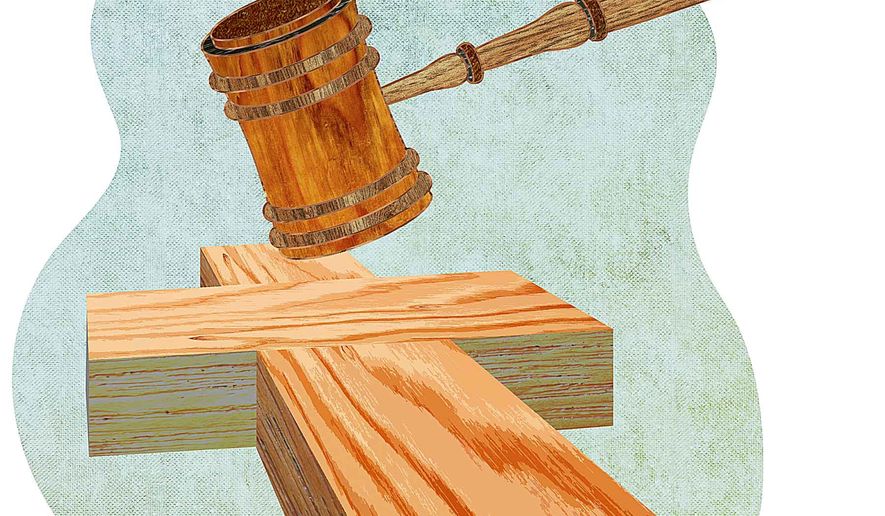OPINION:
As we await word of President Obama’s nominee to succeed Justice Antonin Scalia on the U.S. Supreme Court, we are seeing the first troubling signs of how the court may reshape the future of religious liberties. For the Orthodox Jewish community, and other American faith communities, no issue handled by the court is more important.
Last week, the court declined to take a religious liberty case. While it isn’t unusual for the court to decline cases — it turns down far more than it accepts — what was unusual was the lengthy dissent penned by Justice Samuel Alito. Written dissents over court decisions not to take a case are indeed uncommon.
Also rare was the case itself, in which a Jewish inmate in a North Carolina prison had been denied the right to engage in Jewish religious study based initially on a prison warden’s interpretation of Jewish law.
The inmate, Israel Ben-Levi, had requested to engage in Torah study together with a few other inmates. The warden asserted — wrongly — that since Judaism requires a quorum of 10 to engage in Jewish worship and study, and there aren’t 10 Jews in the prison, the request can be denied. The lower courts, equally inexpert in Jewish law, agreed with the warden’s decision.
Justice Alito viewed this denial as a violation of Ben-Levi’s First Amendment right to “free exercise” of religion. He didn’t base his view on the prison warden’s mystifying misinterpretation of Jewish law, but on the basis that government authorities have no business offering such interpretations altogether.
“Repeatedly and in many different contexts, we have warned that courts must not presume to determine the place of a particular belief in a religion or the plausibility of a religious claim,” Justice Alito wrote, adding, “the Court’s indifference to this discriminatory infringement of religious liberty is disappointing.”
For those of us concerned with religious liberties, the court’s decision is not only “disappointing” but also ominous. We will get more insight into just how ominous in two weeks, as the court hears oral arguments in the Little Sisters of the Poor v. Secretary Burwell case, the latest litigation over the Obamacare “contraceptives mandate.”
At issue is whether a religious nonprofit, such as the Catholic nuns’ poverty organization, shall be exempt, in the same manner as a church itself, from participating in providing of health insurance that includes contraception coverage and other health services the nuns (and others similarly situated) deem objectionable to their religious tenets. The Obama administration claims it has accommodated the nuns by saying they need not provide such health insurance so long as they sign a form stating their objection to doing so. The nuns assert that the very signing of the form makes them, in effect, facilitators of providing what their faith objects to. Thus, like the prisoner’s case, the nuns’ case begs the question of whether government officials may determine the merits of what constitutes a “legitimate” religious claim that should be protected.
Political conservatives who are unfamiliar with the court might presume that religious liberties are now imperiled because of Justice Scalia’s passing. In reality, it was Justice Scalia who created the current predicament about religious liberties. Writing the majority opinion in the 1990 case of Employee Division v. Smith, he eviscerated the strength of claims under the Free Exercise Clause by ruling that government laws which burden religion are permissible so long as they don’t deliberately target religion in a discriminatory way.
In late 2005, when Samuel Alito was nominated to the Supreme Court, critics tagged him as “Scalito” — indicating he would merely follow the senior justice’s lead. They misjudged. In fact, while serving on the court of appeals, then-Judge Alito already had demonstrated a more robust record supporting individual religious freedom claims and had criticized Employee Division v. Smith. And last year, it was Justice Scalia who followed Justice Alito as he wrote the majority opinion in the Hobby Lobby case — upholding the right of a business owner to be exempt from the Obamacare contraceptives mandate if it infringes on religious beliefs.
People of faith are probably praying that whoever is nominated by President Obama or his successor and confirmed to fill Justice Scalia’s seat will have an expansive view of individual religious liberty and the need to protect it under the First Amendment. After all, that swing vote will have to ensure that government officials aren’t second-guessing a person’s commitment to his or her faith, but rather venerating it.
• Nathan Diament is executive director for public policy for the Union of Orthodox Jewish Congregations of America.




Please read our comment policy before commenting.